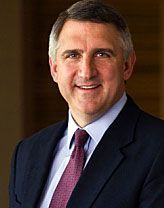Carfilzomib Combination Extends PFS by 8.7 Months in Phase III Myeloma Trial
The combination of carfilzomib, carfilzomib, and low-dose dexamethasone extended PFS by 8.7 months compared with lenalidomide and dexamethasone alone for patients with relapsed multiple myeloma.
Robert A. Bradway

Robert A. Bradway
The combination of carfilzomib (Kyprolis), lenalidomide (Revlimid), and low-dose dexamethasone extended progression-free survival (PFS) by 8.7 months compared with lenalidomide and dexamethasone alone for patients with relapsed multiple myeloma, according to early results from the phase III ASPIRE trial.
In the ASPIRE trial, 792 patients with multiple myeloma who had received at least 1 prior therapy were randomized to lenalidomide and low-dose dexamethasone with or without the proteasome inhibitor carfilzomib. At an interim analysis, the median PFS was 26.3 months with the addition of carfilzomib arm compared with 17.6 months in the control arm (HR=0.69; 95% CI, 0.57-0.83;P<.0001).
Enrollment in the ASPIRE trial completed in February 2012. The number of events needed for a complete analysis of overall survival was not yet reached at the interim analysis. However, a trend favoring the carfilzomib arm was observed. Safety findings were consistent with previous clinical trials.
Amgen and its subsidiary Onyx Pharmaceuticals announced these early results along with plans for a regulatory filing in 2015. A full analysis from the study is expected later this year at the 2014 ASH Annual Meeting.
“In the treatment of patients with multiple myeloma, periods of remission become shorter following each treatment regimen, underscoring the need for new options. The results of the ASPIRE study demonstrate that Kyprolis can significantly extend the time patients live without their disease progressing,” Pablo J. Cagnoni, MD, president, Onyx Pharmaceuticals, said in a press release. “The ability of novel therapies to produce deep and durable responses may, one day, transform this uniformly fatal disease to one that is chronic and manageable.”
The ASPIRE study was preceded by a phase I/II dose escalation trial that evaluated the carfilzomib combination in patients with relapsed and/or refractory multiple myeloma. In this trial, the maximum planned dose for carfilzomib was 20mg/m2on days 1 and 2 of the first cycle followed by 27 mg/m2for subsequent cycles. Lenalidomide and low-dose dexamethasone were delivered at standard doses. This same dosing schedule was utilized in the ASPIRE trial.
According to results from the trial that were presented at the 2013 ASCO Annual Meeting, at the maximum planned dose the overall response rate in patients treated with the carfilzomib combination was 76.9% for a median duration of 22.1 months. The median PFS was 15.4 months.
The most common grade 3/4 adverse events included neutropenia (23%), thrombocytopenia (15%), anemia (15%), hypophosphatemia (13%), fatigue (12%), hyperglycemia (8%), lymphopenia (8%), hyponatremia (6%), diarrhea (6%) and pneumonia (6%).
In the collection of clinical trials exploring the drug, adverse events were recorded from 526 patients. Cardiac death was reported in 7% of these patients, pulmonary arterial hypertension in 2%, grade 3 dyspnea was reported in 5%, and all-grade dyspnea was apparent in 34%. Some cases of hepatic failure were also noted with carfilzomib, in <1% of patients treated with the drug.
“We are excited about these clinical results and the positive prospects they suggest for patients with multiple myeloma,” Robert A. Bradway, chairman and chief executive officer of Amgen, said in a statement. “Our mission at Amgen is to serve patients by advancing medicines that address serious disease. Kyprolis is an important building block in our robust, differentiated pipeline.”
In July 2012, carfilzomib received an initial approval for the treatment of patients with multiple myeloma who had received at least two prior therapies, including bortezomib and an immunomodulatory agent. This decision was based on findings from a single-arm clinical trial that examined the treatment in 266 patients. Full data from the ASPIRE trial were required by the FDA as a condition of the accelerated approval.
Carfilzomib is also being explored as a monotherapy in patients with relapsed and refractory multiple myeloma who have received at least 3 prior therapies. In this phase III trial, labeled FOCUS, carfilzomib is being compared with best supportive care. Results from this analysis are expected soon.
Isa-Kd Stands Out Among Subsequent Regimens in Multiple Myeloma
April 4th 2024During a Case-Based Roundtable® event, Cristiana Costa Chase, MD, discussed the recommended regimens and trials supporting therapies following lenalidomide-refractory relapse of multiple myeloma in the second article of a 2-part series.
Read More